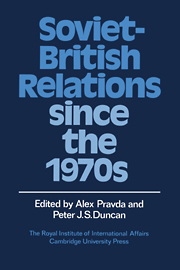Book contents
- Frontmatter
- Contents
- Contributors
- Acknowledgments
- 1 Introduction: pre-perestroika patterns
- 2 The historical perspective
- 3 Soviet perspectives on Britain and British foreign policy
- 4 British perspectives on the Soviet Union
- 5 The security dimension
- 6 Anglo-Soviet relations: political and diplomatic
- 7 The Soviet Union and the Left in Britain
- 8 Anglo-Soviet cultural contacts since 1975
- 9 Trade relations: patterns and prospects
- 10 Doing business with the USSR
- 11 Conclusions: Soviet-British relations under perestroika
- Index
6 - Anglo-Soviet relations: political and diplomatic
Published online by Cambridge University Press: 29 October 2009
- Frontmatter
- Contents
- Contributors
- Acknowledgments
- 1 Introduction: pre-perestroika patterns
- 2 The historical perspective
- 3 Soviet perspectives on Britain and British foreign policy
- 4 British perspectives on the Soviet Union
- 5 The security dimension
- 6 Anglo-Soviet relations: political and diplomatic
- 7 The Soviet Union and the Left in Britain
- 8 Anglo-Soviet cultural contacts since 1975
- 9 Trade relations: patterns and prospects
- 10 Doing business with the USSR
- 11 Conclusions: Soviet-British relations under perestroika
- Index
Summary
INTRODUCTION
Mr Gorbachev's stopover in Britain on the way to his summit meeting in Washington with President Reagan served to symbolise the good working relationship which has developed between the British Government and the Soviet leadership since Mr Gorbachev became General Secretary of the Communist Party of the Soviet Union (CPSU) in March 1985. It was also evidence of the fact that there has been ‘new political thinking’ in both the Soviet Union and Britain.
In the Soviet Union, Gorbachev's attempt to revitalise Soviet foreign policy included the adoption of a set of principles which have become called the ‘new political thinking’. Although they primarily concern relations between the superpowers, they include a new emphasis on interdependence and on the need for flexibility in foreign policy. The Soviet leadership has also declared that the Soviet Union should diversify its foreign relations, in particular so that they are not all seen through the prism of Soviet-American relations. An important aspect of the Soviet view of interdependence is the recognition, first, that Europe has a common history and common problems and second, that the Soviet Union is part of Europe. In Britain, although the term ‘new political thinking’ is not used, there has been a change in policy towards the USSR. During the first Thatcher Government from 1979 to 1983, there was little contact with the Soviet Union. During 1983, however, a decision seems to have been made to raise the profile of bilateral Anglo-Soviet relations.
The invitation to use Britain as a transit point and its acceptance attested to the success of the change in British policy, just as Mrs Thatcher's warm reception in Moscow in March 1987 demonstrated that Mr Gorbachev accords importance to negotiation and dialogue with leaders of other countries irrespective of their political beliefs.
- Type
- Chapter
- Information
- Soviet-British Relations since the 1970s , pp. 120 - 146Publisher: Cambridge University PressPrint publication year: 1990



